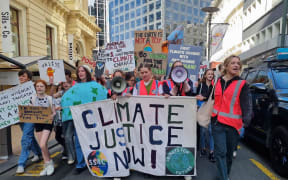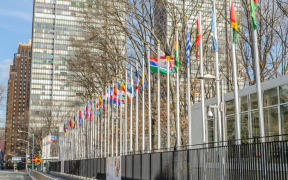
ACT says it would tie New Zealand's emissions cap to the level of our trading partners' emissions but denies that failing to meet the country's Paris Agreement pledge to cut emissions by 50 percent by 2030 would be 'pulling out of Paris'. Photo: 123RF
The ACT Party has raised the possibility it would renege on New Zealand's international climate pledge under the Paris Agreement.
On the campaign trail on Tuesday, the party's leader David Seymour said that as well as repealing the Zero Carbon Act and its emissions budgets, ACT would "tie New Zealand's emissions cap to our trading partners' emissions", saying the country was going further and faster than its partners.
New Zealand has made a pledge under the Paris Agreement on curbing climate change to cut its gross 2005 emissions by 50 percent in net terms by 2030.
A spokesperson for ACT told RNZ that whether the party would want to keep that pledge would depend on the level of our trading partners' emissions reductions.
"If they do, we'll match them."
New Zealand's top trading partners are Australia, the US, the EU, Japan and China, which, as a developing country, under Paris, is expected to peak its emissions later than developed countries such as New Zealand. Emissions from China are expected to rise until 2025 or later.
Asked to confirm if ACT's policy was to go back on New Zealand's Paris commitment if the aggregate emissions reductions of trading partners, including China's, turned out to be less than New Zealand's target, the party confirmed it would depend on partners' emissions and said failing to meet New Zealand's 2030 pledge "wouldn't be pulling out of Paris".
James Every-Palmer of Lawyers for Climate Action said "it would be a giant leap backwards" to renege on our 2030 target.
"We are already seen as being a laggard on climate ambition. It is almost inevitiable that climate groups would challenge the legality of walking away from one of our most important international commitments."
Paris pledges are notoriously hard to compare, and actual emissions can take years to report and verify.
However in headline terms the EU's target is "at least 55 percent" off 1990 levels, Japan's is at least 46 percent and up to 50 percent below 2015 levels, Australia's is 43 percent below 2005 levels, and the USA's is 50-52 percent below 2005 levels.
As a developing country, China's Paris commitment includes peaking emissions before 2030, but its emissions will rise for years yet.
All countries are expected to show progress towards meeting their climate targets each year, rather than waiting until just before 2030 and quickly trying to meet commitments (the waiting approach is also projected to cost more, as the cost of carbon rises).
Reliable emissions totals from many countries do not appear until up to two years after the fact, meaning setting caps based on other countries' emissions could take New Zealand into the second half of the decade.
The Paris Agreement includes what is known as a ratchet mechanism, meaning countries can make deeper pledges than their previous ones, but not reduce the ones they have made.
While Paris itself is not legally binding, countries' pledges are being used to bolster litigation overseas against governments who are not on track to meet targets, as in a successful 2022 case by ClientEarth against the UK government. That case claimed the UK government was not on track to meet its domestic or international targets.
Paris targets are also showing up in free trade agreements, with trade sanctions applying to countries that do not meet them.
For example, New Zealand's Free Trade Agreement with the EU requires both partners to effectively implement their commitments under the Paris Agreement, or face trade sanctions.
The EU is New Zealand's fourth-largest trading partner with two-way trade worth over $20 billion, according to the New Zealand government.
The New Zealand-UK Free Trade Agreement also includes a commitment by both countries to implement the Paris Agreement.
The National Party has said it is committed to the Zero Carbon Act and New Zealand's 2030 Paris target, and has said those promises are "non-negotiable" in any coalition deal with ACT.






